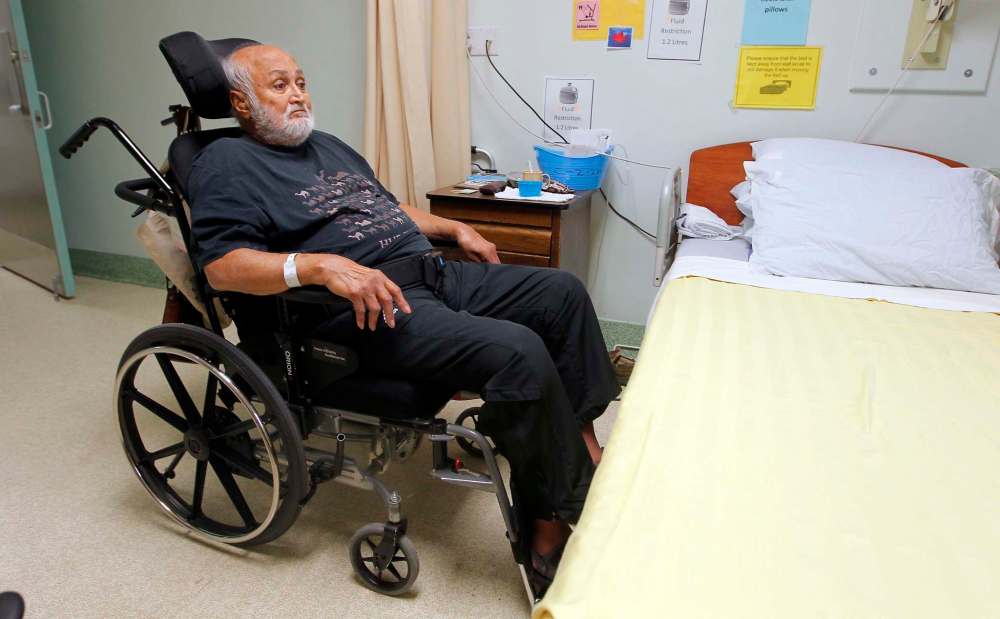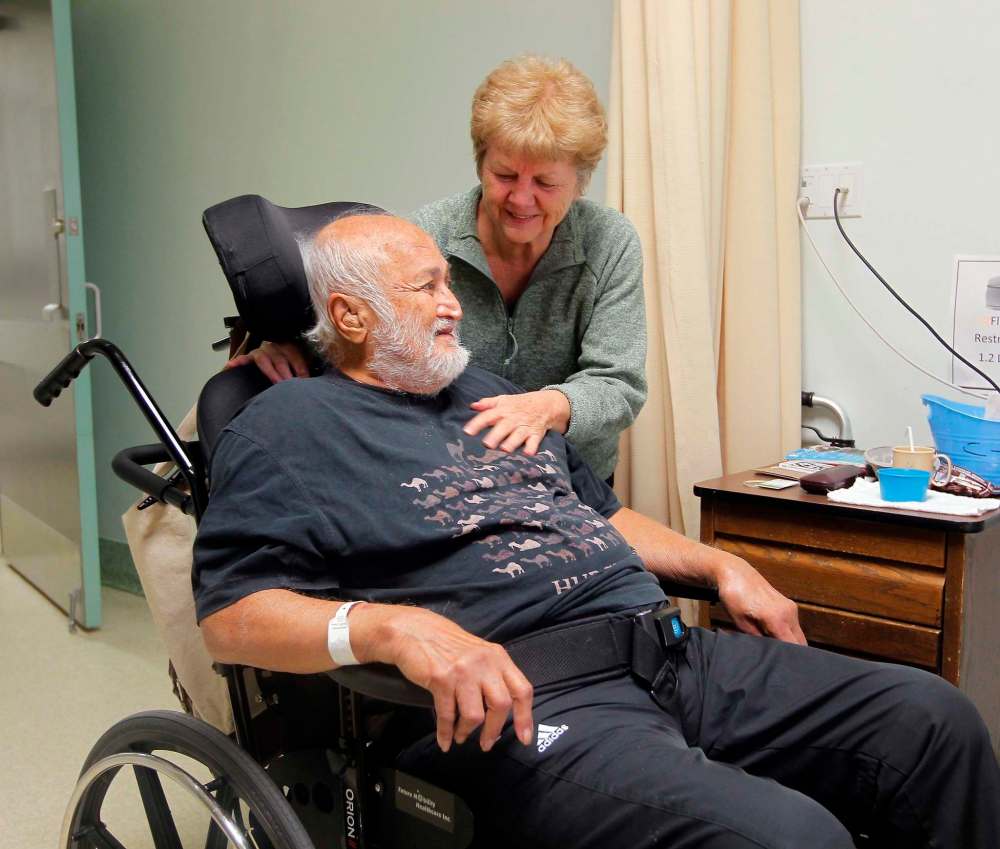Province’s assisted dying team, Misericordia clash over elderly man’s request to end his life
Advertisement
Read this article for free:
or
Already have an account? Log in here »
To continue reading, please subscribe:
Monthly Digital Subscription
$0 for the first 4 weeks*
- Enjoy unlimited reading on winnipegfreepress.com
- Read the E-Edition, our digital replica newspaper
- Access News Break, our award-winning app
- Play interactive puzzles
*No charge for 4 weeks then price increases to the regular rate of $19.00 plus GST every four weeks. Offer available to new and qualified returning subscribers only. Cancel any time.
Monthly Digital Subscription
$4.75/week*
- Enjoy unlimited reading on winnipegfreepress.com
- Read the E-Edition, our digital replica newspaper
- Access News Break, our award-winning app
- Play interactive puzzles
*Billed as $19 plus GST every four weeks. Cancel any time.
To continue reading, please subscribe:
Add Free Press access to your Brandon Sun subscription for only an additional
$1 for the first 4 weeks*
*Your next subscription payment will increase by $1.00 and you will be charged $16.99 plus GST for four weeks. After four weeks, your payment will increase to $23.99 plus GST every four weeks.
Read unlimited articles for free today:
or
Already have an account? Log in here »
Hey there, time traveller!
This article was published 26/10/2017 (2976 days ago), so information in it may no longer be current.
A lonely old man whose most fervent wish is he be allowed to die has sparked conflict between Manitoba’s medical assistance in dying team and the powers that be at Misericordia Health Centre.
To hear a Misericordia spokeswoman tell the story, 87-year-old Cheppudira Gopalkrishna is more than capable of advocating for himself. He eats in the dining room, he’s mobile in a wheelchair, he watches TV in a common room, and even “routinely” visits the hospital’s rooftop garden.
The Winnipeg hospital has helped him whenever he asks to make phone calls, she says, including two to the MAID team. In fact, per its recollection of events, when Gopalkrishna first asked May 1 about reaching out to the team, his care manager not only called the team to inquire but also “immediately” provided Gopalkrishna with its contact information card.
At that point, she says, the religious hospital’s involvement mostly ends. “Going forward the relationship becomes solely between the patient and the MAID team.”

Here, the MAID team rebuts: “At no time did we get a patient name or request to contact him.”
Further, the team writes: “What about the fact the patient couldn’t physically contact us himself?”
While Misericordia says Gopalkrishna is capable, he himself says he is not — “My memory and my mind don’t work that well anymore” — and the team, which has since reviewed his medical files, agrees.
It would take until early October when Gopalkrishna confessed to a hospital volunteer his frustration about being unable to access an assisted death that he was, finally, connected with the team. But weeks of delays ensued with both sides pointing the finger at the other.
Throughout, Gopalkrishna has sat in his room overlooking Cornish Avenue and wished to die.
‘I’m just literally hollowed out in my mind’
“I’m so lonely,” he says, “I’m just literally hollowed out in my mind.”
The retired biology and chemistry teacher speaks haltingly, in a raspy voice. He has a form of ALS, a disease without a cure that slowly robs a person of the ability to walk or talk, eat or swallow, and, eventually, breathe.
Gopalkrishna can’t use his legs, but it isn’t his mobility that makes him want help to die. It’s his mind he finds most unbearable.
He has no one to talk to, he says, except for his wife, Marianne, and even that, he says, feels burdensome. When he dies, he says, “It’ll allow her to resume her life.”

On Thursday morning, Marianne, just back from a week visit to see the couple’s only daughter, Nicola, in Ireland, was regaling him with stories of Nicola’s art show.
Gopalkrishna lives for Marianne’s visits, one each morning and one each evening. He isn’t sure a move to a more vibrant facility with activities and people to talk to would make him want death any less.
“I don’t know,” he says. “How do you make a person happy? It’s a tall order.”
While Marianne could have called the MAID team herself, she says she never did.
Process should never rest entirely on patient: Dying with Dignity
It has to be his decision fully, she says, although its one she supports because, “really, I wouldn’t want to wish that on anybody… I wouldn’t want to just live in bed, 100 per cent dependent on other people.”
Still, she wants no part in the process.
“I’m not a religious person, but if I had to sign something that would be with me my whole life,” she says, “it’s really difficult.”
The responsibility for navigating the assisted dying process should never rest fully with the patient, says Cory Ruf, a spokesman with Dying with Dignity Canada.
“It’s unacceptable for the onus of navigating through the system, of finding out information and connecting Manitobans with the MAID team to be thrust upon the most vulnerable person or people in the process,” Ruf says.
Health-care providers in Manitoba don’t currently have a duty to refer patients who are seeking medical assistance in dying to the team, he says — which leaves those who are immobile or who have communication issues in a vulnerable spot.
“We are concerned that that type of backstop isn’t in place should this happen again because there isn’t sufficient expectations that physicians respond to these types of requests in a timely manner.”
Arrangement for faith-based hospitals scrutinized
Manitoba Health Minister Kelvin Goertzen called the case “troubling.”
“We are trying to strike the right balance between those medical professionals who do not want to participate, while recognizing there is a legal obligation for access,” he told reporters Thursday, while acknowledging that would provide little comfort to Gopalkrishna.
Misericordia Health Centre is one of several health-care facilities in the city devolved from the Winnipeg Regional Health Authority, meaning it receives public funding but is under its own operational control.
This arrangement came under scrutiny in June, when the St. Boniface Hospital — another religious, devolved facility — stacked its hospital board in order to overturn a vote that would have allowed assisted dying on premises in limited circumstances.
In that case, due to the nature of the hospital’s relationship with the WRHA, the health authority declined comment. Pressed on public accountability then, Goertzen said the “process may not be what anybody would consider ideal… but they have followed their rules.”
Neither Goertzen nor WRHA interim president Réal Cloutier directly addressed questions about the relationship between the health authority, which currently houses the MAID team, and devolved facilities in relation to the Misericordia’s handling of Gopalkrishna’s case.
Like all facilities that wish to abstain from offering assisted dying, Misericordia has until Nov. 24 to have its policies approved and posted where the public can access them.
“Obviously, we need to do much, much better,” Cloutier told reporters. He says the WRHA would like to schedule a sit down with Misericordia leaders to figure out a better way to handle requests moving forward.
For now, Gopalkrishna is hopeful his assessment — finally planned for Friday — will bring him one step closer to dying. He wants people to know what he is feeling.
“Tell them I’m very lonely,” he says. “If they have people like me in their company or in their circles to reach out to them, to try to make it a little easier.”
jane.gerster@freepress.mb.ca

